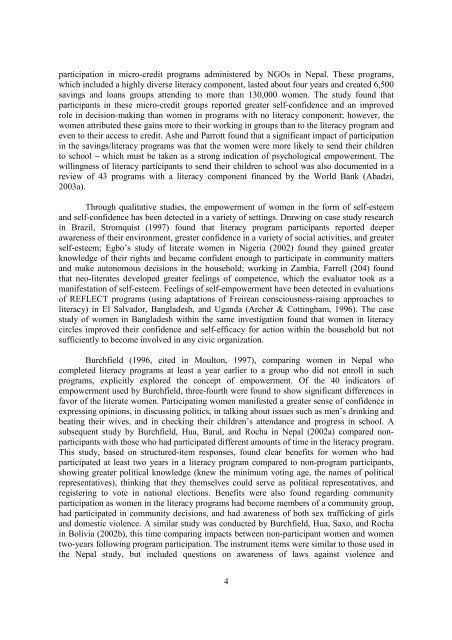Literacy and empowerment: a contribution to the ... - unesdoc - Unesco
Literacy and empowerment: a contribution to the ... - unesdoc - Unesco
Literacy and empowerment: a contribution to the ... - unesdoc - Unesco
You also want an ePaper? Increase the reach of your titles
YUMPU automatically turns print PDFs into web optimized ePapers that Google loves.
participation in micro-credit programs administered by NGOs in Nepal. These programs,which included a highly diverse literacy component, lasted about four years <strong>and</strong> created 6,500savings <strong>and</strong> loans groups attending <strong>to</strong> more than 130,000 women. The study found thatparticipants in <strong>the</strong>se micro-credit groups reported greater self-confidence <strong>and</strong> an improvedrole in decision-making than women in programs with no literacy component; however, <strong>the</strong>women attributed <strong>the</strong>se gains more <strong>to</strong> <strong>the</strong>ir working in groups than <strong>to</strong> <strong>the</strong> literacy program <strong>and</strong>even <strong>to</strong> <strong>the</strong>ir access <strong>to</strong> credit. Ashe <strong>and</strong> Parrott found that a significant impact of participationin <strong>the</strong> savings/literacy programs was that <strong>the</strong> women were more likely <strong>to</strong> send <strong>the</strong>ir children<strong>to</strong> school – which must be taken as a strong indication of psychological <strong>empowerment</strong>. Thewillingness of literacy participants <strong>to</strong> send <strong>the</strong>ir children <strong>to</strong> school was also documented in areview of 43 programs with a literacy component financed by <strong>the</strong> World Bank (Abadzi,2003a).Through qualitative studies, <strong>the</strong> <strong>empowerment</strong> of women in <strong>the</strong> form of self-esteem<strong>and</strong> self-confidence has been detected in a variety of settings. Drawing on case study researchin Brazil, Stromquist (1997) found that literacy program participants reported deeperawareness of <strong>the</strong>ir environment, greater confidence in a variety of social activities, <strong>and</strong> greaterself-esteem; Egbo’s study of literate women in Nigeria (2002) found <strong>the</strong>y gained greaterknowledge of <strong>the</strong>ir rights <strong>and</strong> became confident enough <strong>to</strong> participate in community matters<strong>and</strong> make au<strong>to</strong>nomous decisions in <strong>the</strong> household; working in Zambia, Farrell (204) foundthat neo-literates developed greater feelings of competence, which <strong>the</strong> evalua<strong>to</strong>r <strong>to</strong>ok as amanifestation of self-esteem. Feelings of self-<strong>empowerment</strong> have been detected in evaluationsof REFLECT programs (using adaptations of Freirean consciousness-raising approaches <strong>to</strong>literacy) in El Salvador, Bangladesh, <strong>and</strong> Ug<strong>and</strong>a (Archer & Cottingham, 1996). The casestudy of women in Bangladesh within <strong>the</strong> same investigation found that women in literacycircles improved <strong>the</strong>ir confidence <strong>and</strong> self-efficacy for action within <strong>the</strong> household but notsufficiently <strong>to</strong> become involved in any civic organization.Burchfield (1996, cited in Moul<strong>to</strong>n, 1997), comparing women in Nepal whocompleted literacy programs at least a year earlier <strong>to</strong> a group who did not enroll in suchprograms, explicitly explored <strong>the</strong> concept of <strong>empowerment</strong>. Of <strong>the</strong> 40 indica<strong>to</strong>rs of<strong>empowerment</strong> used by Burchfield, three-fourth were found <strong>to</strong> show significant differences infavor of <strong>the</strong> literate women. Participating women manifested a greater sense of confidence inexpressing opinions, in discussing politics, in talking about issues such as men’s drinking <strong>and</strong>beating <strong>the</strong>ir wives, <strong>and</strong> in checking <strong>the</strong>ir children’s attendance <strong>and</strong> progress in school. Asubsequent study by Burchfield, Hua, Baral, <strong>and</strong> Rocha in Nepal (2002a) compared nonparticipantswith those who had participated different amounts of time in <strong>the</strong> literacy program.This study, based on structured-item responses, found clear benefits for women who hadparticipated at least two years in a literacy program compared <strong>to</strong> non-program participants,showing greater political knowledge (knew <strong>the</strong> minimum voting age, <strong>the</strong> names of politicalrepresentatives), thinking that <strong>the</strong>y <strong>the</strong>mselves could serve as political representatives, <strong>and</strong>registering <strong>to</strong> vote in national elections. Benefits were also found regarding communityparticipation as women in <strong>the</strong> literacy programs had become members of a community group,had participated in community decisions, <strong>and</strong> had awareness of both sex trafficking of girls<strong>and</strong> domestic violence. A similar study was conducted by Burchfield, Hua, Saxo, <strong>and</strong> Rochain Bolivia (2002b), this time comparing impacts between non-participant women <strong>and</strong> womentwo-years following program participation. The instrument items were similar <strong>to</strong> those used in<strong>the</strong> Nepal study, but included questions on awareness of laws against violence <strong>and</strong>4
















